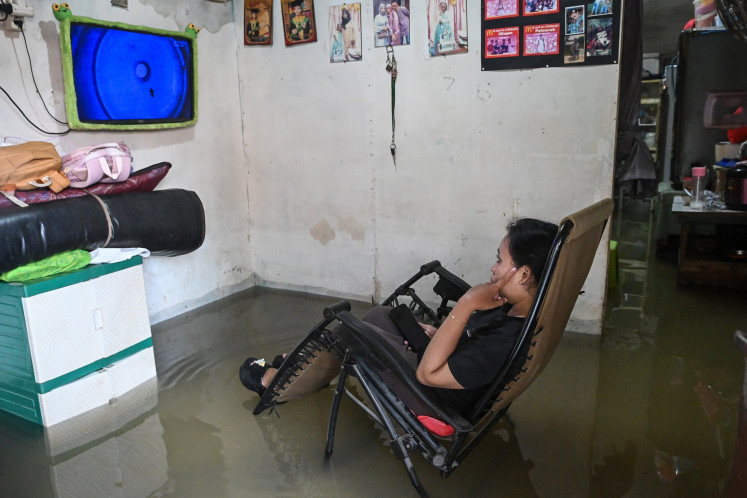Popular Reads
Top Results
Can't find what you're looking for?
View all search resultsPopular Reads
Top Results
Can't find what you're looking for?
View all search resultsLiving without fuel subsidies
Oil subsidies have become a serious topic for the government
Change text size
Gift Premium Articles
to Anyone
O
il subsidies have become a serious topic for the government. Both the coordinating minister for the economy and finance minister do not hesitate to speak openly about a possible reduction of oil subsidies.
This is understandable because Indonesia’s status as a net oil importer since 2003 has stirred a panic every time world oil prices spike. The state of panic will be more severe if price volatility far exceeds the estimate used to draft the state budget.
While the government will not subsidize high-octane Pertamax and promises to improve the distribution of subsidized gasoline, Premium, the fear of turmoil in world oil prices continues.
This shows that the government is fully aware and more realistic about increasing oil consumption, while realizing that oil production is declining.
Based on the latest British Petroleum data released in 2010, Indonesia’s oil production fell by 3.5 percent while consumption increased by 3.2 percent annually over the last 10 years. Without fundamental changes, in the next 20 years fuel consumption will almost double, and more than 80 percent of this will be met through imports. Whoever governs this beloved republic will surrender to oil price shocks, except if Indonesia emerges as a wealthy nation.
Actually, there is nothing wrong with subsidies, as long as they are allocated to important things and reach the right parties. But in practice, Indonesia’s fuel subsidy is neither effective nor educative and is enjoyed mostly by the rich. According to Pertamina president director Karen Agustiawan, private cars consumed 46 percent of subsidized fuels, followed by motorbikes with 39 percent and public transports with 15 percent. From a geographical point of view, 59 percent of the subsidized fuels were distributed in Java and Bali.
There are at least three points we need to consider related to fuel subsidies. First, the subsidy is intended to secure economic stability rather than boost the grassroots economy. Second, due to the poor quality of public transport services, the ownership of private vehicles is on the rise. Third, the high dependence on fossil fuels indicates a low energy diversification.
There are energy efficiency (EE), energy diversification (DE) and renewable energy (RE) measures in place, but these have apparently been unsuccessful. Why?
First, in general, these programs are not running well due to lack of seriousness and focus. As a result, nothing is done. Everyone is busy only when the topic is hot. One of the victims is the Jatropha biodiesel program. Second, there is no adequate coordination and commitment between parties related to energy. This causes no sense of responsibility and belonging. Third, a lack of funds and mastery of technology stand between Indonesia and these programs.
EE, DE and RE programs require that the government formulate and implement appropriate solutions. To promote EE, public awareness of energy conservation should start now, using all public information and education tools, such as the media, schools, etc.
Then, the master plan for Mass Rapid Transportation (MRT) should be immediately executed, especially in big cities. Bureaucratic barriers to this plan must be cleared. In addition, the government should strictly restrict the use of older vehicles, which are more inefficient in terms of fuel consumption.
If necessary, the government should think of unusual ways to streamline economic activities without compromising growth, for example, by optimizing economic activities during weekdays. Germany’s experience in implementing business activities for 5.5 days a week should be considered. It needs a comprehensive study, particularly on its negative impacts on low-income people who work in the informal sector.
The government has to make full use of advancements in Information and Communication Technology (ICT) to reduce mobility. Business-based e-marketing and other types of work that can be done from home must be supported. This will significantly reduce fuel consumption.
For DE, the promotion of gas for vehicles should be supported, although it is not a long-term solution. The most important thing is to guarantee the availability of its distribution. Indonesia’s gas reserves can last for 44 years (BP, 2010), but they will quickly run out if explorations increases.
For RE, the development of biodiesel from Jatropha planted on degraded land is a step in the right direction. Of course, this will improve the people’s economy and reduce the burden on the city from the energy side. Furthermore, small and medium industrial vehicles that run on electricity need to be developed.
If Indonesia wants to avoid an energy crisis in the future, the long-term solution has to begin right now. Please do not hesitate to cut oil subsidies, but please invest more in the development of EE, DE, and RE.
The writer is a researcher at the Solar Energy Research Group, Vehicle Systems Engineering Department, School of Creative Engineering, Kanagawa Institute of Technology, Japan.










